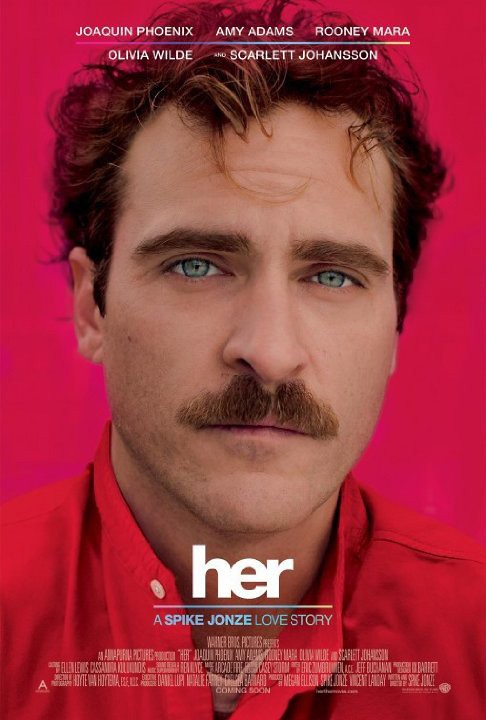What if computers became so humanlike, complete with personalities, voices, emotions and desires, that you could fall in love with them? Director Spike Jonze explores this in “Her,” a beautiful movie about heartbreak, moving on and finding love and human companionship in an increasingly technological world.
The Los Angeles of “Her” is set in the not-so-distant future and is realistically constructed and captured by Jonze. Today, we occasionally pretend it’s rude to be on your phone in the presence of company, whereas in the world of tomorrow, people are allowed to be as insular as they want. No one jokingly mentions how they can’t get off their phones or how we’ve become antisocial. People walk around with earpieces connected to their PDAs, mumbling to themselves as they instruct the voices in their heads to read their emails or play music.
Theodore Twombly (Joaquin Phoenix) is one of these technologically connected people. We find him estranged from his wife Catherine (Rooney Mara), in the second year of the divorce process. He can’t bring himself to sign the papers. His job is to write other people’s love letters as a service for those who can’t find the time or ability to express their emotions to their loved ones. Theodore is outstanding at his job.
When he goes home at night, he plays an video game with an in-game avatar that swears at him. The programmer’s grandfather was probably once a 13-year-old terrorizing Xbox Live. Theodore’s life is one of unfulfilling solitude. The hole left by his wife (who is also his childhood friend) is like the presence of a ghost. Apart from his friend Amy (Amy Adams), Theodore doesn’t connect with anyone.
That is, until he meets his new operating system, Samantha (voiced by Scarlett Johansson). She talks, thinks, learns and feels, and communicates with Theodore via his PDA and earpiece. She has a snarky personality and gibes Theodore, and she is able to read thousands of books in a fraction of a second while simultaneously composing piano concertos. As Samantha’s desire to experience what it’s like to be a human grows, so does Twombly’s affection for her. Eventually, the two start dating and, just like any relationship, theirs has its highs and lows.
The reality that a relationship between a human and a computer works onscreen is a testament to all involved. Joaquin Phoenix runs through the gamut of emotions, from a lost waywardness expressed in his vacant eyes to carefree jubilation, and he is able to do so without a present coactor; he is reacting to a disembodied voice. Johansson’s voice-over work has been so highly praised that people wonder whether she could merit any award nominations as a supporting actress. You actually feel Samantha’s presence from only her voice, which makes it believable that Theodore could fall for her.
Jonze served as both director and writer, and is able to draw the audience to this relationship with his talents. The film manages, apart from maybe a single occurrence, to successfully avoid the very real risk of coming off as ridiculous. There is a sex scene between Theodore and Samantha that is tastefully done.
Toward the end of the film, Amy reaches the conclusion: “We are only here briefly, and in this moment, I want to allow myself joy. So, fuck it.” At first, this seems like a typical existential conclusion and a declaration that we should do what we want and be free to love who we want.
But where does such a sentiment stand if, in the film’s closing shot, we are left with two humans, Theodore and Amy, together on a roof — and not the unorthodox relationship of a human and his OS?
Perhaps a computer leaving her boyfriend because she’s too advanced is just the same as any other breakup.
‘Her’ successfully navigates human-tech relations
January 17, 2014









